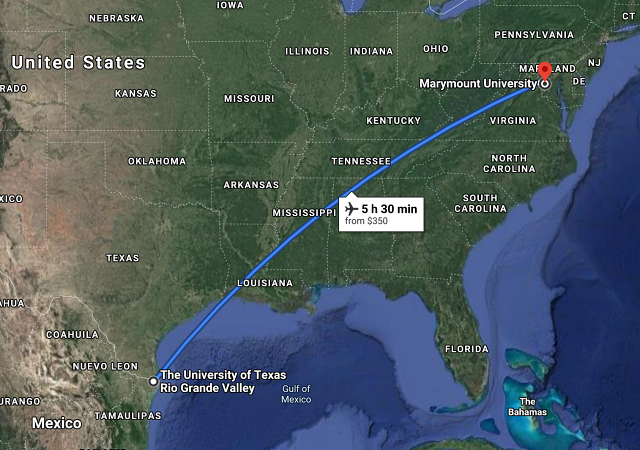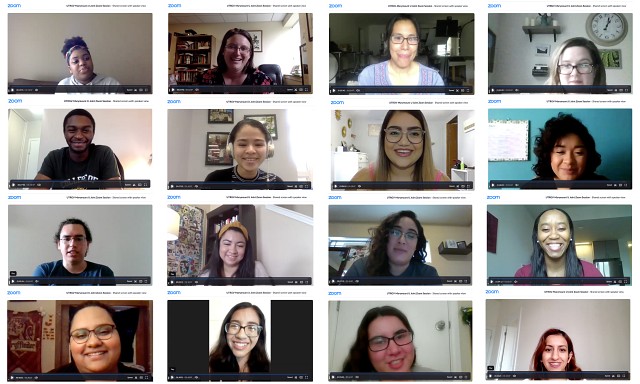UTRGV Mexican American Literature course bridges trip gap through letter writing correspondence
UTRGV Mexican American Literature course bridges Study Away gap through letter writing correspondence
Wednesday, July 29, 2020
Around Campus
By Amanda Taylor
RIO GRANDE VALLEY, TEXAS / ARLINGTON, VA. – The COVID-19 pandemic may have cancelled a Study Away trip for one UTRGV Mexican American Literature class, but the group gained meaningful experiences despite travel restrictions.
Dr. Noreen Rivera, assistant professor within the UTRGV Department of Literatures and Cultural Studies, had planned to take her class on an Office of Global Engagement-approved Study Away trip to Washington, D.C., for a week, and to Marymount University in Arlington, Virginia, where colleague Dr. Leigh Johnson could arrange a joint class session on Mexican American Literature.
The trip was meant to expose students to some sightseeing in Washington, D.C, and help incorporate concepts from their readings, along with meeting students from Marymount University who were studying the same literature.
“As a way to bring our students together prior to our D.C. trip, before the semester I came up with the idea of having our students be pen pals,” Rivera said. “My colleague gave me her class roster and I organized pen pal groups of Marymount and UTRGV students. Students emailed letters to each other throughout the semester about what they were learning in class, and shared their culture.”
In an effort to make the most of the situation after the trip had to be cancelled, students in Rivera’s Mexican American Literature class took a traditional communication concept – pen pals – and revamped it to create a bridge of experience from a learning community almost 2,000 miles away.
Communicating as pen pals is certainly not a new concept. It is a highly traditional form of communication that predominately used handwritten letters as a form of correspondence with someone from another country or city.

“I’m a child of the 1980s and ‘90s, so I remember pre-internet days, when I’d get a pen pal letter from a friend over the summer and I felt really special. I’d be invested in it, eager to write back and put that stamp on the letter,” Rivera said. “But of course, with technology you can create that same intrigue and excitement.”
Initially intended to be an ice breaker before students got to meet their counterparts in the course, the letters became more frequent and personal, as the ties between their curriculum and the pandemic became a bridge.
Marymount is a private school on the East Coast with an international student majority, Rivera said, and her colleague’s students enjoyed reading emails and letters from UTRGV students about the South Texas borderlands and Mexican culture.
Johnson, an assistant professor of Literature and Languages at Marymount, said the students adapted well to the pen pal concept and process.
“Students are usually energized in class and are excited to talk about the material, but to go home and reflect on the material while writing about it to someone else was just really valuable in ways I hadn’t thought about before,” Johnson said. “It never occurred to me that it would be good pedagogy. It was so overwhelmingly good that we are definitely hoping to do it again.”
Likewise, Rivera’s students had the opportunity to learn about Puerto Rican, Arab, African American and Dominican cultures from their pen pals at Marymount, who also were studying Mexican American literature.
OPENING UP IDEAS
“The pen pal concept is a very good idea because we get to share with them and they get to share with us,” said Rene Rocha, a UTRGV senior English major. “Even with normal things, I think when people see that other lives are just like ours, we can relate to each other much more that way. We can get past petty prejudices or just racist ideas. It did open up a lot of ideas for all of us.”
Reciprocating these sentiments, Ariana Luna, a UTRGV senior studying History and Mexican American Studies, said using the pen pal system actually helped her realize some of her own personal interpretations from the readings.
“It’s a good way to communicate with people who are very much different from you but also discuss content and literature. You may be in a different part of the world and hundreds of miles away, but being able to discuss this literature opened more doors for us,” she said.
With so many professors and instructors moving into online or remote learning, concerns for how to maintain a quality education for students is a constant stress, Rivera said, especially for students who prefer face-to-face classroom experiences.
Rivera said it was amazing to see how well these racially diverse student bodies got to know each other during tumultuous times, given the pandemic and the recent global climate. Both Rivera and Johnson plan to incorporate the pen pal system throughout the upcoming fall and spring semesters.
“This is the kind of meaningful learning possible when instructors build bridges with colleagues from other universities and install these bridges as part of one's teaching,” Rivera said.
“It's a learning that not only reinforces course material and learning outcomes, but also increases cultural respect and knowledge of our diverse brothers and sisters who comprise our human family,” she said.

ABOUT UTRGV
The University of Texas Rio Grande Valley (UTRGV) was created by the Texas Legislature in 2013 as the first major public university of the 21st century in Texas. This transformative initiative provided the opportunity to expand educational opportunities in the Rio Grande Valley, including a new School of Medicine and a School of Podiatry, and made it possible for residents of the region to benefit from the Permanent University Fund – a public endowment contributing support to the University of Texas System and other institutions.
UTRGV has campuses and off-campus research and teaching sites throughout the Rio Grande Valley including Brownsville (formerly The University of Texas at Brownsville campus), Edinburg (formerly The University of Texas-Pan American campus), Harlingen, Weslaco, McAllen, Port Isabel, Rio Grande City and South Padre Island. UTRGV, a comprehensive academic institution, enrolled its first class in the fall of 2015; the School of Medicine welcomed its first class in the summer of 2016, and the School of Podiatric Medicine in the fall of 2022.
